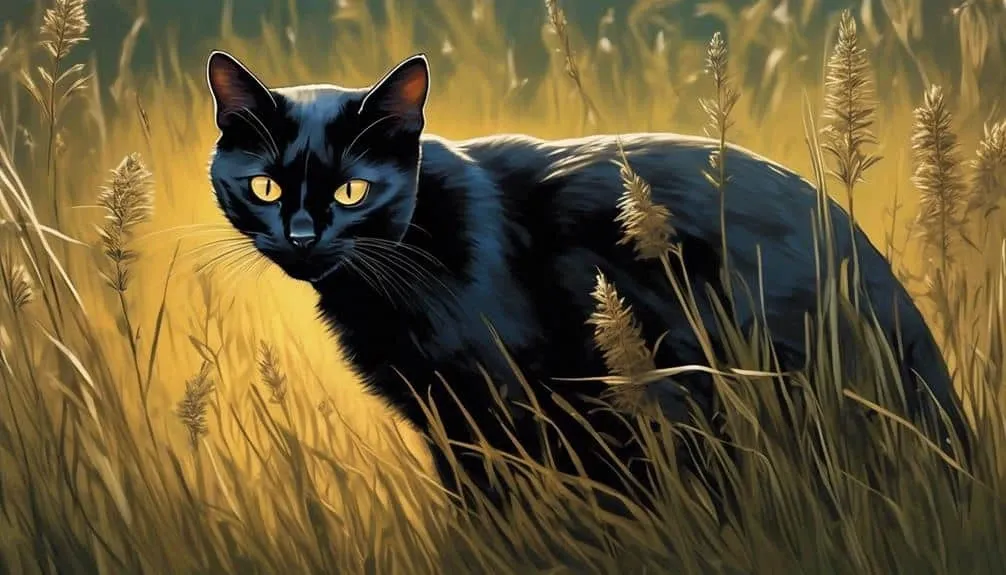The Best Fluffy Pancakes recipe you will fall in love with. Full of tips and tricks to help you make the best pancakes.

Did you know that your seemingly innocent cat's bird hunting spree may have serious consequences?
While it's natural for cats to have an instinctual drive to chase and capture prey, their pursuit of birds can pose risks not only to the avian population but also to your feline companion.
In this article, we will uncover the hidden dangers of cats eating birds, including the potential for parasites and diseases.
But that's not all – we'll also explore the environmental impact of cats killing birds and provide you with practical strategies to prevent your cat from causing harm while still allowing them to satisfy their hunting instincts.
Stay tuned to discover how you can effectively manage your cat's deadly bird hunt and ensure the well-being of both your furry friend and our feathered neighbors.
Key Takeaways
- Cats have a natural instinct to hunt, and hunting behavior is not connected to hunger.
- Eating birds can be dangerous for cats, as feathers and small bones can cause health issues.
- Cats may play with prey instead of killing if they are not hungry or if the prey is difficult to catch.
- Cats killing birds can have a significant negative impact on native wildlife populations.
Hunting Behavior of Cats
Cats are highly skilled predators with a natural instinct to hunt, exhibiting an opportunistic approach to their hunting behavior. Understanding the importance of play for cats is crucial to providing them with mental and physical stimulation.
Hunting behavior serves as a way for cats to exercise their natural instincts, keeping their minds sharp and bodies agile. Through play, cats can engage in activities that mimic hunting, such as pouncing, chasing, and capturing toys. This not only provides them with entertainment but also helps them release energy and prevent boredom.
Playtime helps cats maintain a healthy weight, improves their coordination and reflexes, and promotes a positive bond between cats and their owners. By incorporating play into their daily routine, cat owners can ensure that their feline companions stay mentally and physically stimulated, leading to overall better health and well-being.
Dangers of Cats Eating Birds
After understanding the hunting behavior of cats, it's important to be aware of the potential dangers that can arise when cats eat birds.
Feathers and small bones in birds can cause indigestion in cats, leading to symptoms such as drooling, gagging, and regurgitation. Additionally, foreign objects, such as bones, can get stuck in the esophagus, causing discomfort. If your cat shows any signs of discomfort or indigestion, it's crucial to seek veterinary assistance.
Cats that aren't accustomed to eating birds may also experience food poisoning, as birds can carry bacteria or toxins that can cause illness. Symptoms of food poisoning include vomiting, diarrhea, restlessness, and drooling. Prompt medical attention from a veterinarian is necessary to diagnose and treat food poisoning, alleviating discomfort and preventing further complications.
Parasites and Diseases
Parasites and diseases can pose a significant threat to both cats and birds when cats engage in hunting behavior. Cats can contract various parasites and diseases from the birds they catch, which can have a negative impact on their health. Common parasites that can be transmitted include roundworms, tapeworms, fleas, ticks, and mites. These parasites can cause serious infections in cats, especially in kittens or those with weakened immune systems.
To prevent transmission, it's important to take preventative measures such as regular deworming, flea and tick control, and regular veterinary check-ups. Additionally, keeping cats indoors or providing them with safe outdoor enclosures can help reduce their exposure to infected birds and minimize the risk of contracting parasites and diseases.
Environmental Impact of Cats Killing Birds
The impact of cats killing birds extends beyond the health risks posed by parasites and diseases. It also has significant consequences for bird populations and conservation efforts.
Feral cats in Australia alone are responsible for killing over 20 billion native species per year, including endangered birds. Cats, both feral and domestic, can kill between five to 30 animals a day, leading to severe population declines and even the extinction of native species.
In Hawaii, feral cats have already contributed to the death of at least 237 endangered birds.
To mitigate the impact on bird populations, spaying, neutering, licensing, microchipping, and keeping cats indoors are important steps. These measures can help protect native wildlife and support conservation efforts.
Preventing Cats From Killing Birds
To prevent cats from killing birds, there are various strategies and measures that can be implemented to minimize their hunting behavior.
One effective approach is to create a bird-friendly garden by planting vegetation that offers shelter and food for birds, such as native plants and trees that produce berries or nectar. Additionally, providing bird feeders and water sources away from areas accessible to cats can divert their attention.
Another method is training cats to ignore birds by using positive reinforcement techniques. This involves rewarding cats when they exhibit calm behavior around birds and redirecting their focus on other activities, such as interactive play with toys. It's important to note that consistency and patience are key in training cats to ignore their natural hunting instincts.
Conclusion
In conclusion, while it may seem like harmless play, a cat's natural hunting instinct can have serious consequences for both the cat and the bird population.
Cats eating birds can lead to the spread of parasites and diseases, as well as have a negative impact on the environment.
By implementing practical strategies to prevent your cat from harming birds, you can ensure the safety of both your feline companion and the local bird species.
So, take action today to manage your cat's hunting behavior and protect our feathered friends.








